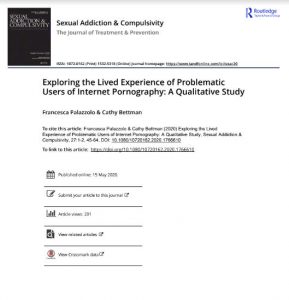Mental Health
Exploring the Lived Experience of Problematic Users of Internet Pornography: A Qualitative Study.
 Full Article Name: Exploring the Lived Experience of Problematic Users of Internet Pornography
Full Article Name: Exploring the Lived Experience of Problematic Users of Internet Pornography
Open Access: No
Abstract
Internet Pornography (IP) is a phenomenon that has been the focus of much research and debate recently, yet there is still a lack of consensus regarding when the use of IP becomes problematic. There is also a lack of qualitative research on the effects of IP on those who self-identify as experiencing problematic use. This phenomenological, qualitative study surveyed 53 self-identified users of IP. Thematic analysis of the results found that users experienced a number of psychosocial impacts attributed to their use of IP, such as diminished positive mental health and wellbeing, detrimental effects on relationships and intimacy, and symptoms of dependency. Suggestions for further research are made.
Relevance
Participants described symptoms of anxiety and depression, poor concentration, and an inability to focus on essential tasks. They also reported feelings of shame, low self-worth, and guilt. Many also reported that there use of IP [internet pornography] led to reduced sleep and, as a consequence, low mood and feeling unmotivated or lethargic during the day. This seems to have had an adverse flow-on effect, influencing their engagement with work or study, social activities, and significant others. Many participants reported feelings of loneliness and alienation as well as self-imposed isolation.”
“Respondents reported a lack of intimacy and engagement in “real-life” relationships. These included both sexually intimate and platonic or familial relationships. They reported ongoing use of IP made them less likely to seek out connections with other people, including friends, family members, partners, children, and notably, members of the opposite sex.”
“The participants reported experiencing symptoms of feeling “addicted” to IP. The language of dependency, i.e., “cravings,” being “sucked in,” and “habit,” was used often. Participants also reported symptoms and experiences consistent with addictive disorders such as; an inability to reduce use of IP, increased use of IP over time or needing to use more extreme forms of IP to get the same effect, use of IP as a way to manage discomfort or gain a sense of satisfaction or “high,” and continuing to use IP despite negative consequences and life outcomes.”
The main finding of the study was that for these participants, problematic and chronic use of IP has resulted in significant personal suffering and has had a mostly negative effect on their mental health and their ability to engage in positive, healthy relationships. It has also led them to experience a kind of dependency, not dissimilar to the experiences described by persons with substance use disorders.”
The study supports that “problematic IP use fits into an addiction framework and should be considered a similar disorder.”
Citation
Palazzolo, F., & Bettman, C. (2020) . Exploring the lived experience of problematic users of internet pornography: A qualitative study. Sexual Addiction & Compulsivity, 27(1-2), 45-64. https://doi.org/10.1080/10720162.2020.1766610
